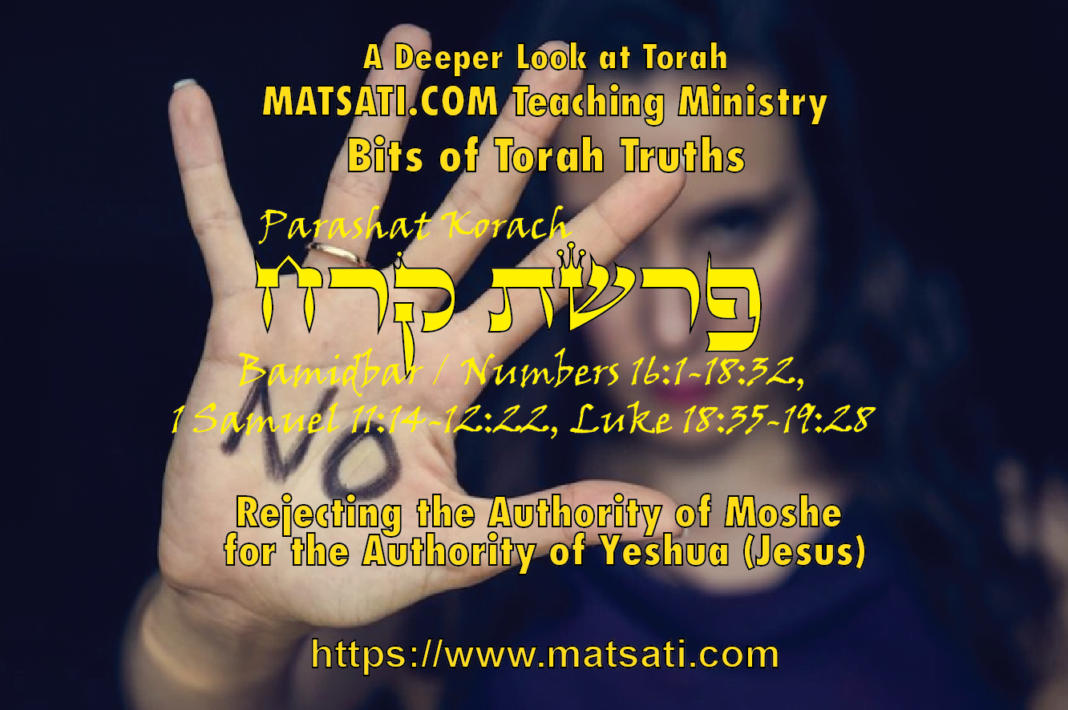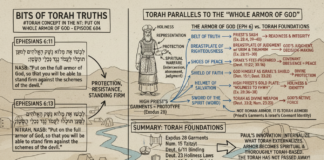In the third Aliyah of Parashat Korach we read about a miracle and something very significant regarding faith in the one in whom God has sent to deliver His people. In this week’s Torah portion, we read the Lord God saying the following to Moshe according to Bamidbar / Numbers 17:16-21. Note there is a 15 verse numbering discrepancy when reading the Hebrew bible as compared to the English translation, looking at the Septuagint reveals a similar numbering as the English translations. This suggests how heavy dependence of the English translations upon the Septuagint. God said to Moshe the following according to Bamidbar / Numbers 17:16-21: טז וַיְדַבֵּר יְהוָֹה אֶל-מֹשֶׁה לֵּאמֹר: יז דַּבֵּר | אֶל-בְּנֵי יִשְֹרָאֵל וְקַח מֵאִתָּם מַטֶּה מַטֶּה לְבֵית אָב מֵאֵת כָּל-נְשִֹיאֵהֶם לְבֵית אֲבֹתָם שְׁנֵים עָשָֹר מַטּוֹת אִישׁ אֶת-שְׁמוֹ תִּכְתֹּב עַל-מַטֵּהוּ: יח וְאֵת שֵׁם אַהֲרֹן תִּכְתֹּב עַל-מַטֵּה לֵוִי כִּי מַטֶּה אֶחָד לְרֹאשׁ בֵּית אֲבוֹתָם: יט וְהִנַּחְתָּם בְּאֹהֶל מוֹעֵד לִפְנֵי הָעֵדוּת אֲשֶׁר אִוָּעֵד לָכֶם שָׁמָּה: כ וְהָיָה הָאִישׁ אֲשֶׁר אֶבְחַר-בּוֹ מַטֵּהוּ יִפְרָח וַהֲשִׁכֹּתִי מֵעָלַי אֶת-תְּלֻנּוֹת בְּנֵי יִשְֹרָאֵל אֲשֶׁר הֵם מַלִּינִם עֲלֵיכֶם: כא וַיְדַבֵּר מֹשֶׁה אֶל-בְּנֵי יִשְֹרָאֵל וַיִּתְּנוּ אֵלָיו | כָּל-נְשִֹיאֵיהֶם מַטֶּה לְנָשִֹיא אֶחָד מַטֶּה לְנָשִֹיא אֶחָד לְבֵית אֲבֹתָם שְׁנֵים עָשָֹר מַטּוֹת וּמַטֵּה אַהֲרֹן בְּתוֹךְ מַטּוֹתָם: 17:1 Then the Lord spoke to Moses, saying, 17:2 “Speak to the sons of Israel, and obtain from them a staff for each father’s household: twelve staffs, from all their leaders for their fathers’ households. You shall write each man’s name on his staff, 17:3 and write Aaron’s name on the staff of Levi; for there is to be one staff for the head of each of their fathers’ households. 17:4 You shall then leave them in the tent of meeting in front of the testimony, where I meet with you. 17:5 And it will come about that the staff of the man whom I choose will sprout. So I will relieve Myself of the grumblings of the sons of Israel, who are grumbling against you.” (NASB) What is happening here is God needs to establish who was His chosen one, המשיח (anointed one) who would lead His People and perform the services in the Mishkhan to make atonement before God. The rabbis look at this phrase וְאֵת שֵׁם אַהֲרֹן תִּכְתֹּב עַל-מַטֵּה לֵוִי and ask the question why God instructed Moshe to have Aaron write his name on his staff too. This staff was the same one that had been used to perform all of the miracles in Egypt, and so because of this the staff of God was known and so Aaron would not have had to write his name. Some rabbis also say this staff was similar to the others and so Aaron had to write his name on it. (Ibn Ezra on Numbers 17:17 Part 1) What this miracle is doing is establishing the God of Israel as creator and choosing the tribe of Levi to perform the special duties in the Mishkhan. The big question is why would this miracle be necessary if the fire killing the 250 men and the destruction of Korach proved that Aaron and Moshe were specifically chosen of God. Perhaps the people thought that Korach’s sin was that he challenged Moses so that God had to defend the honor of His prophet? The point is, what happened to Korach did not prove that God was unwilling to choose another tribe from which the High Priest would be selected. (Or HaChaim on Numbers 17:20 Part 1) The God of Israel was not just demonstrating his choice of persons and tribe, He was also establishing His authority to choose and the authority of His prophet Moshe. Note how those who spoke against Moshe and Aaron there were three different methods of punishment, (i) the swallowing up by the earth (going to the grave alive), (ii) the burning by fire, and (iii) death through the plague. If we consider these things, how serious of an offence is it to disrespect Moshe and the Torah today? Thinking about this, “How often today do people speak against Moshe and the Torah of God as being passed away?” Yeshua said according to John 5:46, אִלּוּ הֶאֱמַנְתֶּם לְמֹשֶׁה, הֱיִיתֶם מַאֲמִינִים לִי, כִּי עָלַי כָּתַב “if you really believed Moses, you would believe me, because he wrote about me.” This is why studying the Torah is so important! Are we able to even recognize the Messiah if we have not studying all of Scripture? Regardless of how obvious these things may be, there will still be some who complain and challenge what the Scriptures say due to their theologies. We note the miracle of the sprouting staff demonstrated God as the living God, how the chosen one of God, his staff sprouted and produced fruit, producing life from the dead, while the other staffs remained dead. The fact that the staff sprouted producing blossoms and fruit is in contrast to the negative comments from the people which produced death and the three punishments (death by going to the grave alive, the burning by fire, and the plague). “The Torah stresses the words: ‘the house of Levi,’ to show that it was not merely Aaron’s appointment that was confirmed thereby but the appointment of the entire tribe of Levi for its respective task as outlined in Numbers chapter eight.” (Rabbeinu Bahya, Bamidbar 17:20 Parts 1-2) The rabbis general consensus is this miracle demonstrated the authority of Moshe and Aaron without a doubt!
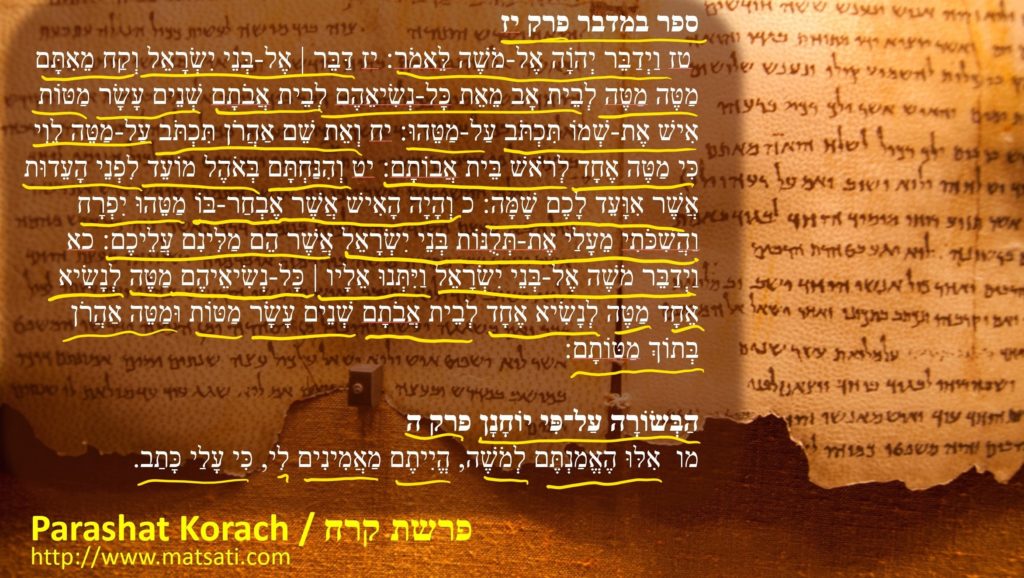
We note something about rejecting Moshe, from the previous Torah portion, Miriam spoke harshly against Moshe and she was as if dead due to the dreaded skin disease she was afflicted by. Today, how often do we hear people rejecting Moshe and the Torah. In a recent comment on Gab, I had someone tell me that Yeshua did not teach Torah, he taught against the Torah. This is surprising as it demonstrates not fully grasping the place of Torah in the in the Judaism of Yeshua’s day, and what is contained in the NT which is derived from the Torah as teaching us to love God and love one another.
The Scriptures we are looking at for this week are from Bamidbar / Numbers 17:1-13 (English Translation) or Bamidbar / Numbers 17:16-28 (Hebrew Bible).
ספר במדבר פרק יז
טז וַיְדַבֵּר יְהוָֹה אֶל-מֹשֶׁה לֵּאמֹר: יז דַּבֵּר | אֶל-בְּנֵי יִשְֹרָאֵל וְקַח מֵאִתָּם מַטֶּה מַטֶּה לְבֵית אָב מֵאֵת כָּל-נְשִֹיאֵהֶם לְבֵית אֲבֹתָם שְׁנֵים עָשָֹר מַטּוֹת אִישׁ אֶת-שְׁמוֹ תִּכְתֹּב עַל-מַטֵּהוּ: יח וְאֵת שֵׁם אַהֲרֹן תִּכְתֹּב עַל-מַטֵּה לֵוִי כִּי מַטֶּה אֶחָד לְרֹאשׁ בֵּית אֲבוֹתָם: יט וְהִנַּחְתָּם בְּאֹהֶל מוֹעֵד לִפְנֵי הָעֵדוּת אֲשֶׁר אִוָּעֵד לָכֶם שָׁמָּה: כ וְהָיָה הָאִישׁ אֲשֶׁר אֶבְחַר-בּוֹ מַטֵּהוּ יִפְרָח וַהֲשִׁכֹּתִי מֵעָלַי אֶת-תְּלֻנּוֹת בְּנֵי יִשְֹרָאֵל אֲשֶׁר הֵם מַלִּינִם עֲלֵיכֶם: כא וַיְדַבֵּר מֹשֶׁה אֶל-בְּנֵי יִשְֹרָאֵל וַיִּתְּנוּ אֵלָיו | כָּל-נְשִֹיאֵיהֶם מַטֶּה לְנָשִֹיא אֶחָד מַטֶּה לְנָשִֹיא אֶחָד לְבֵית אֲבֹתָם שְׁנֵים עָשָֹר מַטּוֹת וּמַטֵּה אַהֲרֹן בְּתוֹךְ מַטּוֹתָם: כב וַיַּנַּח מֹשֶׁה אֶת-הַמַּטֹּת לִפְנֵי יְהוָֹה בְּאֹהֶל הָעֵדֻת: כג וַיְהִי מִמָּחֳרָת וַיָּבֹא מֹשֶׁה אֶל-אֹהֶל הָעֵדוּת וְהִנֵּה פָּרַח מַטֵּה-אַהֲרֹן לְבֵית לֵוִי וַיֹּצֵא פֶרַח וַיָּצֵץ צִיץ וַיִּגְמֹל שְׁקֵדִים: כד וַיֹּצֵא מֹשֶׁה אֶת-כָּל-הַמַּטֹּת מִלִּפְנֵי יְהֹוָה אֶל-כָּל-בְּנֵי יִשְֹרָאֵל וַיִּרְאוּ וַיִּקְחוּ אִישׁ מַטֵּהוּ: פ [ששי] כה וַיֹּאמֶר יְהֹוָה אֶל-מֹשֶׁה הָשֵׁב אֶת-מַטֵּה אַהֲרֹן לִפְנֵי הָעֵדוּת לְמִשְׁמֶרֶת לְאוֹת לִבְנֵי-מֶרִי וּתְכַל תְּלוּנֹּתָם מֵעָלַי וְלֹא יָמֻתוּ: כו וַיַּעַשֹ מֹשֶׁה כַּאֲשֶׁר צִוָּה יְהוָֹה אֹתוֹ כֵּן עָשָֹה: פ כז וַיֹּאמְרוּ בְּנֵי יִשְֹרָאֵל אֶל-מֹשֶׁה לֵאמֹר הֵן גָּוַעְנוּ אָבַדְנוּ כֻּלָּנוּ אָבָדְנוּ: כח כֹּל הַקָּרֵב | הַקָּרֵב אֶל-מִשְׁכַּן יְהוָֹה יָמוּת הַאִם תַּמְנוּ לִגְוֹעַ:
Bamidbar / Numbers 17:1-13
17:1 Then the Lord spoke to Moses, saying, 17:2 “Speak to the sons of Israel, and obtain from them a staff for each father’s household: twelve staffs, from all their leaders for their fathers’ households. You shall write each man’s name on his staff, 17:3 and write Aaron’s name on the staff of Levi; for there is to be one staff for the head of each of their fathers’ households. 17:4 You shall then leave them in the tent of meeting in front of the testimony, where I meet with you. 17:5 And it will come about that the staff of the man whom I choose will sprout. So I will relieve Myself of the grumblings of the sons of Israel, who are grumbling against you.” 17:6 So Moses spoke to the sons of Israel, and all their leaders gave him a staff, one for each leader, for their fathers’ households, twelve staffs in all, with the staff of Aaron among their staffs. 17:7 Then Moses left the staffs before the Lord in the tent of the testimony. 17:8 Now on the next day Moses went into the tent of the testimony; and behold, Aaron’s staff for the house of Levi had sprouted and produced buds and bloomed with blossoms, and it yielded ripe almonds. 17:9 Moses then brought out all the staffs from the presence of the Lord to all the sons of Israel; and they looked, and each man took his staff. 17:10 But the Lord said to Moses, “Put the staff of Aaron back in front of the testimony to be kept as a sign against the rebels, so that you may put an end to their grumblings against Me and they do not die.” 17:11 Moses did so; just as the Lord had commanded him, so he did. 17:12 Then the sons of Israel spoke to Moses, saying, “Behold, we are passing away, we are perishing, we are all perishing! 17:13 Everyone who comes near, who comes near to the tabernacle of the Lord, must die. Are we to perish completely?” (NASB)
According to Devarim / Deuteronomy 18, the Lord God Almighty speaks to Moshe to tell the people of Israel these words, נָבִ֨יא אָקִ֥ים לָהֶ֛ם מִקֶּ֥רֶב אֲחֵיהֶ֖ם כָּמ֑וֹךָ וְנָתַתִּ֤י דְבָרַי֙ בְּפִ֔יו וְדִבֶּ֣ר אֲלֵיהֶ֔ם אֵ֖ת כָּל־אֲשֶׁ֥ר אֲצַוֶּֽנּוּ׃ וְהָיָ֗ה הָאִישׁ֙ אֲשֶׁ֤ר לֹֽא־יִשְׁמַע֙ אֶל־דְּבָרַ֔י אֲשֶׁ֥ר יְדַבֵּ֖ר בִּשְׁמִ֑י אָנֹכִ֖י אֶדְרֹ֥שׁ מֵעִמּֽוֹ׃ “I will raise up for them from among their own people a prophet like yourself, in whose mouth I will put My words and who will speak to them all that I command; and anybody who fails to heed the words speaks in My name, I Myself will call to account” (Devarim / Deuteronomy 18:18-19).The scriptures also describes the נְבִיא הַשֶּׁקֶר (false prophet) those who speak words that are not from God. The נְבִיא הַשֶּׁקֶר gave false messages in God’s name or he or she prophesies in the name of false gods. Yeshua said in Matthew 5:19 Therefore, whoever nullifies one of the least of these commandments, and teaches others to do the same, shall be called least in the kingdom of heaven; but whoever keeps and teaches them, he shall be called great in the kingdom of heaven. (NASB) If we consider what is written in Devarim / Deuteronomy 20 and Devarim / Deuteronomy 13 we learn about a warning from God that people will come and try to draw God’s people away to serve false gods through false doctrines or signs and wonders. This is equivalent to turning someone away from the command of God to depart from the way of God. This is beyond what Yeshua was talking about as those whom Yeshua was talking about were those who speak negatively or attempt to turn people away from the command of God but yet continue in their faith in the God of Israel and Yeshua. That which is spoken about in Devarim / Deuteronomy is related to those who want to turn one away from the way of God to serve false gods, which include many things not limited to a physical idol made of wood and stone, but things such as money, self, sex, etc. The issue of false prophets is not merely theoretical, there are many examples from the Bible showing us their existence and how these Scriptures apply to us today as there are many so-called Prophets even today.
The point of turning one away from the Torah of God, or teaching that Yeshua taught against the Torah is a very dangerous endeavor as there is the possibility of being forever lost! This is the problem with the theologies that make Yeshua (Jesus) out to be a false prophet when saying he taught against the Torah of God. I have heard it said Yeshua taught against the Law (Torah) as if the Torah of God is bad. This is a dangerous and heretical theological conclusion, and this is the parallel that we have today in what we see going on between Moshe, Aaron, and the people in this week’s Torah Portion. In light of these things, Yeshua’s words become all the more weighty when he said, אִלּוּ הֶאֱמַנְתֶּם לְמֹשֶׁה, הֱיִיתֶם מַאֲמִינִים לִי, כִּי עָלַי כָּתַב “if you really believed Moses, you would believe me, because he wrote about me.” (John 5:46) Based upon what we are studying here, by rejecting Moshe and what he wrote (the Torah) one consequentially rejects the authority of Moshe and the authority of Yeshua!
Note what Rashi writes concerning these things according to Bamidbar / Numbers 17:23.
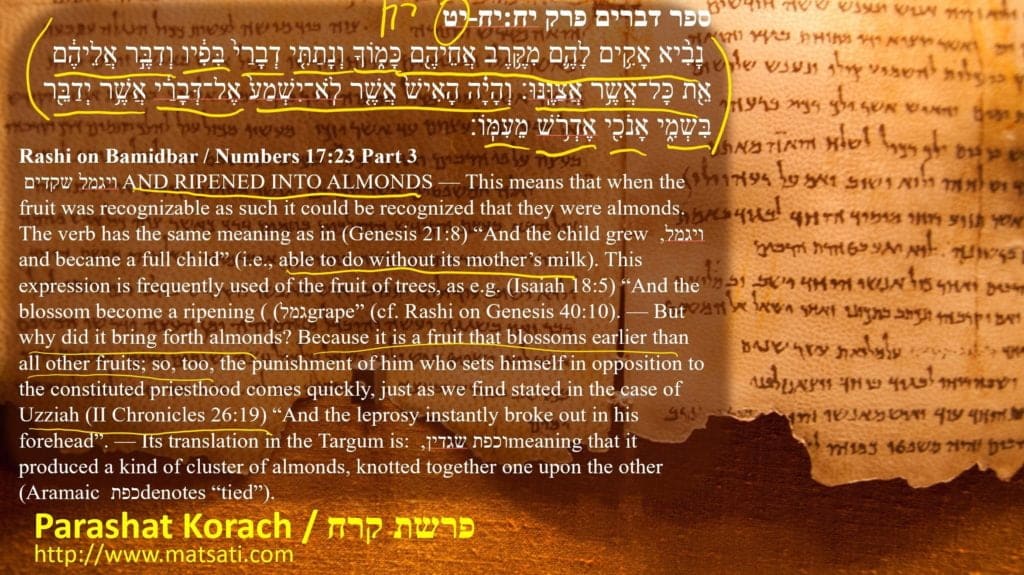
Rashi on Bamidbar / Numbers 17:23 Part 3
ויגמל שקדים AND RIPENED INTO ALMONDS — This means that when the fruit was recognizable as such it could be recognized that they were almonds. The verb has the same meaning as in (Genesis 21:8) “And the child grew ויגמל, and became a full child” (i.e., able to do without its mother’s milk). This expression is frequently used of the fruit of trees, as e.g. (Isaiah 18:5) “And the blossom become a ripening (גמל) grape” (cf. Rashi on Genesis 40:10). — But why did it bring forth almonds? Because it is a fruit that blossoms earlier than all other fruits; so, too, the punishment of him who sets himself in opposition to the constituted priesthood comes quickly, just as we find stated in the case of Uzziah (II Chronicles 26:19) “And the leprosy instantly broke out in his forehead”. — Its translation in the Targum is: וכפת שגדין, meaning that it produced a kind of cluster of almonds, knotted together one upon the other (Aramaic כפת denotes “tied”).
It is interesting how Rashi draws out a meaning from Bereshit / Genesis 21:8 and how a child doing without its mothers milk is usually an expression reserved for fruit trees. Note how when we walk according to the spirit, we are doing what? We are producing fruit as the NT text states in many places. What kind of fruit is produced? Paul wrote that when we walk according to the spirit we do not sin. (Romans 8:1-17, Galatians 5:16) What does it mean to not walk in sin? Sin by its very definition is to disobey God’s command. This line of reasoning draws out the conclusion that the Holy Spirit of God in our lives helps us to walk in God’s ways according to the Torah, obeying His מִצְווֹת (Mitzvot, Commands), חקים (statutes), and מִּשְׁפָּטִים (Mishpatim, Judgements). Rashi here describes the miracle of life from God. Remember it is only by a miracle of God through faith in Yeshua that we receive the Holy Spirit and consequentially produce the fruit of God just as we see here in the Torah portion! Rashi believes there is a parallel to growing up like a child where one doesn’t need mother’s milk anymore. This appears to be a direct correlation to the maturing of Faith which is also connected to the authority of Moshe (i.e. how the people stood in opposition to the priesthood demonstrating their disrespect for the authority of Moshe). This means for us as we grow we should be continuing in God’s word, reading, studying, applying, and growing so as not needing the milk any more. This is what the author of Hebrews had in mind when saying, 5:11 Concerning him we have much to say, and it is difficult to explain, since you have become poor listeners. 5:12 For though by this time you ought to be teachers, you have need again for someone to teach you the elementary principles of the actual words of God, and you have come to need milk and not solid food. 5:13 For everyone who partakes only of milk is unacquainted with the word of righteousness, for he is an infant. 5:14 But solid food is for the mature, who because of practice have their senses trained to distinguish between good and evil. (NASB) We note how these words are in the context of a teaching on Melchizedek and the priesthood of Yeshua which is in heaven. Could it be those whom he was writing and speaking to were spiritually immature so as not to understand the truth of his teaching and consequentially the differences between heaven and earth and the work of Yeshua? When reading from Hebrews 5, we note the prohibition against mixing milk and meat, “do not cook a kid in its mother’s milk,” which appears a total of 3 times in the Torah (Shemot / Exodus 23:19, 34:26 and Devarim / Deuteronomy 14:21). Isn’t this an interesting comparison to the one who is supposed to give up the milk, for the meat alone according to the author of Hebrews? There is a whole lot more that could be said on this topic!
While surveying the rabbinic literature, there is also a discussion on the reasons why almonds was the fruit that was produced as opposed to some other fruit. Almonds are not what Israel is famous for, this is something that is outside of the norm. In the rabbinic conversations there is a discussion on the growth cycle of the almond. Although this species blossoms quickly, it does not produce fruit that quickly. This is descriptive of a sort of how the Lord God of Israel can transform us instantly, and then the work of God in our lives of sanctification can take the remainder of our lives. Note the following references from the Scriptures:
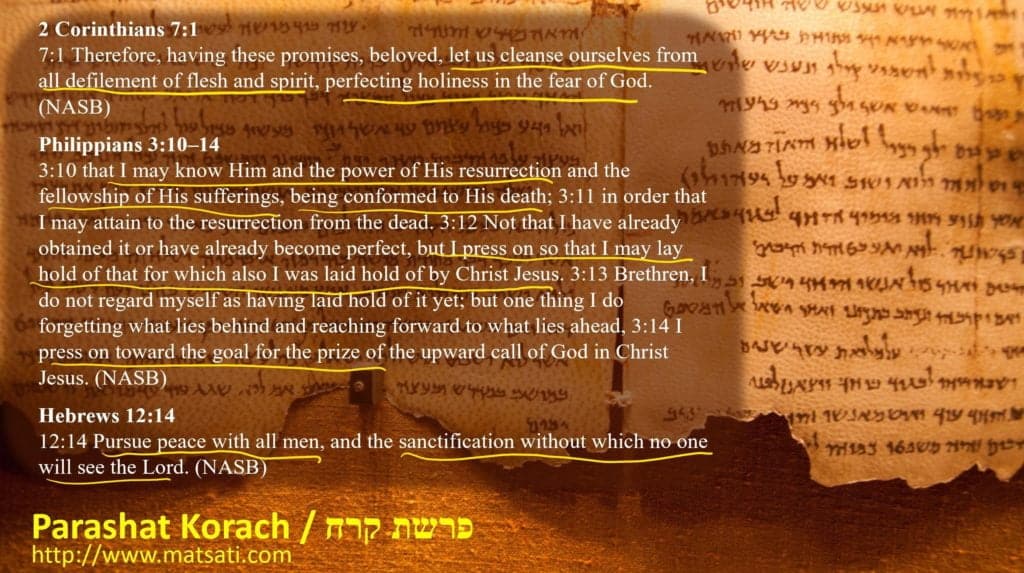
2 Corinthians 7:1
7:1 Therefore, having these promises, beloved, let us cleanse ourselves from all defilement of flesh and spirit, perfecting holiness in the fear of God. (NASB)
Philippians 3:10–14
3:10 that I may know Him and the power of His resurrection and the fellowship of His sufferings, being conformed to His death; 3:11 in order that I may attain to the resurrection from the dead. 3:12 Not that I have already obtained it or have already become perfect, but I press on so that I may lay hold of that for which also I was laid hold of by Christ Jesus. 3:13 Brethren, I do not regard myself as having laid hold of it yet; but one thing I do forgetting what lies behind and reaching forward to what lies ahead, 3:14 I press on toward the goal for the prize of the upward call of God in Christ Jesus. (NASB)
Hebrews 12:14
12:14 Pursue peace with all men, and the sanctification without which no one will see the Lord. (NASB)
We see in 2 Corinthians 7:1 Paul writes that we are to cleanse ourselves from the defilement of flesh and spirit. This speaks to our turning away from sexual sin and spiritual idolatry. Notice the connection here Paul is making to these things and our walk with God in holiness and fear. This is very rabbinic of Paul to write in this way as the rabbis are always making these kinds of comparisons. In Philippians 3 Paul writes of the power of God in our lives through the resurrection, as this leads to victory over sin and death. Paul speaks of obtaining this resurrection, but as living in this world, we strive for this victory and the end goal of the power of God in our lives to overcome this world, which is the upward call of the God of Israel on our lives in Yeshua the Messiah! In Hebrews 12:14 we read the call to be at peace with all men. All of these things are a process in our lives as we enter into a relationship with the God of Israel through faith in His Messiah and the indwelling of His Spirit! We note that without the authority of the Messiah who conquered sin and death in our lives, we are unable to do maasim tovim (good works)! Paul went on in Philippians 4:13 saying “I can do all things through Him who strengthens me.” This is the abiding in the Messiah (Christ) that was spoken of so often by Paul. (Colossians 1:11, 1 Timothy 1:12, 2 Timothy. 1:7 and; 2:1) which is coupled to His authority in our lives. This is a miracle of God, in the sense of the almonds, God worked His creative process growing almonds through seasons of growth in a matter of hours. This is a miracle, just as we can say without a doubt how God miraculously works in our lives through faith in Yeshua His Son! According to Midrash Rabbah Bamidbar / Numbers 18 Part 23, the rabbis say that “the reason God chose almonds was to serve as a warning that anyone who would challenge that the priesthood belonged to the descendants of Aaron would be dealt with very promptly.” These things function as a warning to us to not speak against any part of God’s Word. The reason being, life and death, sin and righteousness, justice, mercy, goodness, truth (these massim tovim of godliness), and even ungodliness are all defined according to the Torah! The Spirit of God who dwells within guides us in truth and justice, mercy and peace by faith in Yeshua, and these things are intimately coupled to the Torah, the Prophets, and the Writings (the OT text)! The basic conclusion that may be drawn from Parashat Korach is related to this illustration on the dangers of speaking against God’s word, against God’s chosen one Moshe and Aaron, and the intimate connection that ties the Torah to Yeshua the Messiah of God according to John 5:46. God’s Word is supposed to function authoritatively in our lives and rejecting a portion of Scripture for another portion of Scripture is dangerous as leading to death and destruction! We however “Praise the Lord” for the giving of His Holy Spirit which guides us in all truth and righteousness according to His holy Words! And not just that, but the victory that we have in the Messiah to overcome sin by faith such that we can live our lives for the glory of God!
